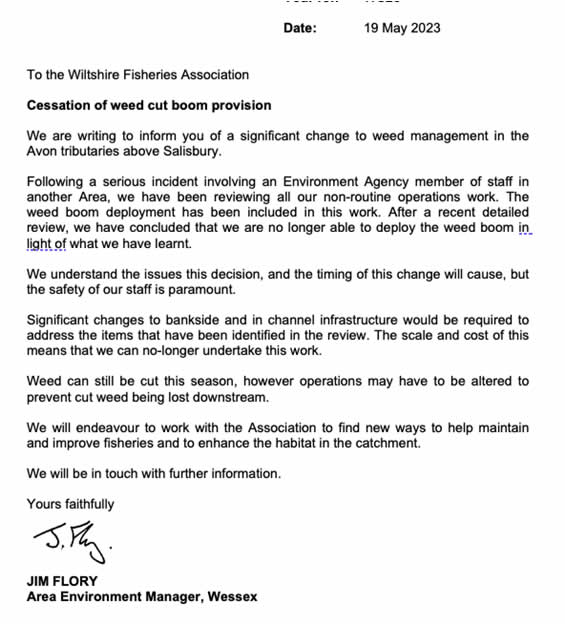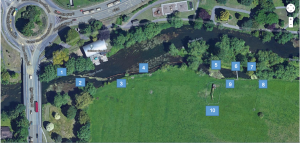Wiltshire Fishery Weed Cutting Dates 2024
Wiltshire Fishery Association Weed Cutting Dates 2024
Read below or download HERE
| River Wylye – Bathampton to Chilhampton | No | |
| CUTTING | CLEARING DOWN | Days |
| Free weed cutting period – Thurs 14th to Wed 27th April | 3 | |
| Sat 13th – Tue 23rd May | Wed 24th & Thur 25th May | 13 |
| Wed 28th June – Thur 13th July | Fri 14th & Sat 15th July | 18 |
| Wed 16th – Wed 23rd Aug | Thur 24th & Fri 25th Aug | 10 |
| 44 | ||
| River Wylye – Below Chilhampton | ||
| CUTTING | CLEARING DOWN | |
| Free weed cutting period – Thurs 14th to Wed 27th April | 3 | |
| Tue 16th – Fri 26th May | Sat27th & Sun28th May | 13 |
| Fri 30 Jun – Sat 15th July | Sun 16th & Mon 17th July | 18 |
| Fri 18th – Fri 25th Aug | Sat26th & Sun 27th Aug | 10 |
| 44 | ||
| River Nadder | ||
| CUTTING | CLEARING DOWN | |
| Free weed cutting period – Thurs 14th to Wed 27th April | 3 | |
| Sat 13th – Tues 23rd May | Wed 24th & Thurs 25th May | 13 |
| Wed 28th June – Thurs13th July | Fri 14th & Sat 15th July | 18 |
| Wed 16th – Wed 23rd Aug | Thurs 24th & Fri 25th Aug | 10 |
| 44 | ||
| River Avon – Above Crossing ‘C’ | ||
| CUTTING | CLEARING DOWN | |
| Sun 23rd April to Sun 7th May | Mon 8th & Tues 9th May | 17 |
| Mon 12th to Sat 24th June | Sun 25th & Mon 26th June | 15 |
| Mon 24th July to Wed 2nd Aug | Thurs 3rd & Fri 4th August | 12 |
| 44 | ||
| River Avon – Below Crossing ‘C’ | ||
| CUTTING | CLEARING DOWN | |
| Thurs 27th Apr to Fri 11th May | Sat 12th & Sat 13th May | 17 |
| Fri 16th to Wed 28th June | Thurs 29th & Fri 30th Jun | 15 |
| Wed 26th July to Fri 4th August | Sat 5th & Sun 6th August | 12 |
| 44 | ||
*Free Weed Cut – River Wylye & Nadder
Allows for a Maximum 3-days light cutting (by hand only) from 14th to 27th April, which includes clearing down. You MUST inform your downstream neighbour before cutting and when you have finished clearing down. Clubs should try to remove cut weed where possible only allowing the minimum amount to travel downstream. Representatives from EA, NE & WFA will continue to monitor weed cutting.
*EA weed booms will not be deployed during the period of the Free weed cut.
*Areas where there are salmon and trout redds and a potential for juvenile fry emergence, especially after a cold winter/early spring, should be left uncut.
IMPORTANT NOTES
Under the Environmental Permitting (England and Wales) Regulations 2010 – ‘Exempt Water Discharge Activity’ – The Environment Agency allows members of the Wiltshire Fishery Association to cut weed on the agreed dates and in accordance with the conditions of the exemption.
This programme of dates is now agreed for 2022 and there is no intention to amend it, unless circumstances arise when this is necessary. In that event, the changes will be posted on the this site under “NEWS” and circulated to River Email Groups. Before you cut weed, it is your responsibility to check both the website and your email group.
- With the exception of the *Free Weed Cut in April on the Wylye and Nadder (see separate notes above), cutting MUST start at the beginning of the dates allowed.
- You MUST inform your downstream neighbour before cutting and when you have finished clearing down and of any subsequent problems.
- Regular communication with your upstream and downstream neighbours is essential to ensure trouble-free weed cutting and clearing down.
- Cutting of weed outside of the authorised dates, without the Agency’s consent, constitutes an offence under Section 90 of the Water Resources Act 1991.
- Unauthorised cutting should be reported immediately to the Environment Agency using their Pollution Hotline Tel: 0800 80 70 60 – Note the exact location (grid reference), date & time & take photographs. Do not enter neighbouring property unless you have permission to do so.
- Weed cutting should be undertaken in a manner that is sensitive to the needs of the river habitat. Overzealous cutting of in-river weed or marginal vegetation can significantly reduce water levels, which can have a negative impact on invertebrates, fish and other wildlife.
- In all cases the final two days, as shown separately in the table above, MUST be regarded as ‘clearing down’ days and any weed not cut before these days, left uncut. In some circumstances, especially in low water periods, you may need to extend the period of clearing down beyond two days, to ensure there’s plenty of time for cut weed to move through the system.
- Report all blockages and any other weed related issues immediately to the WFA Hon Sec:
For WFA membership and other enquires contact: Martin Browne – Honorary Secretary
Mobile: 07768354788 email: Please use sire contact form.


